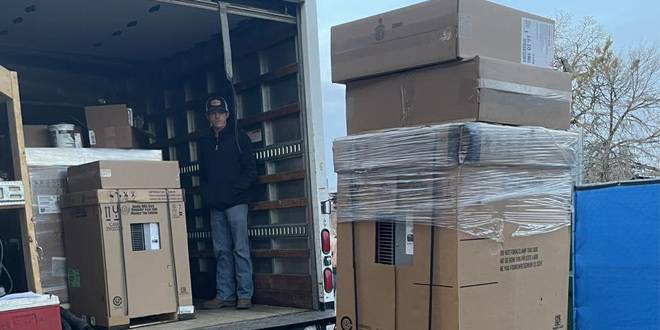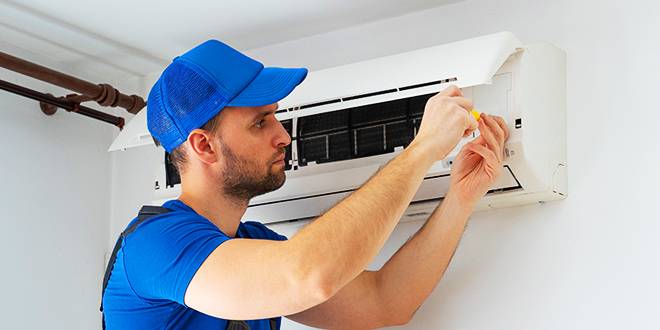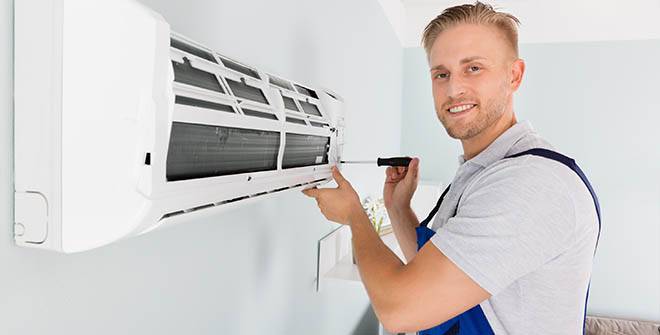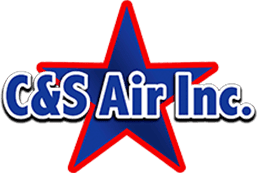
When it comes to keeping your space cool and comfortable, not all air conditioning systems are created equal. From central air conditioning to ductless mini-split systems, each type of AC system offers unique features and benefits. Let’s explore the different types of AC systems available and help you decide which one is right for you.
Central Air Conditioning:
Central air conditioning is a popular choice for homeowners and businesses looking to cool larger spaces. This system uses ducts to distribute cool air throughout the building, providing consistent and efficient cooling.
Important Parts:
Central air conditioning systems consist of an outdoor unit containing a compressor, condenser coil, and a fan, and an indoor unit containing an evaporator coil and an air handler. The system also includes ductwork to distribute the cooled air.
Maintenance Tips:
Regular maintenance is crucial for optimal performance. Change air filters regularly, clean the outdoor unit, check ducts for leaks, and schedule professional maintenance annually.
Efficiency:
Central air conditioning systems can vary in efficiency, with newer models offering higher SEER ratings, indicating greater efficiency. Look for ENERGY STAR® certified units for maximum energy savings.
Cost Considerations:
The cost of a central air conditioning system can vary depending on factors such as the size of the space, the efficiency of the unit, and the complexity of the installation. However, they are generally more expensive than other types of AC systems.

Ductless Mini-Split Systems:
Ductless mini-split systems are ideal for homes or businesses without ductwork. These systems consist of an outdoor compressor unit and one or more indoor air-handling units, allowing for customizable cooling in different zones of your space.
Important Parts:
Ductless mini-split systems consist of an outdoor unit containing a compressor and condenser coil, and one or more indoor units containing an evaporator coil and a fan. The indoor units are connected to the outdoor unit by refrigerant lines and require no ductwork.
Maintenance Tips:

Clean or replace air filters regularly, clean the indoor and outdoor units, check refrigerant levels, and schedule professional maintenance annually.
Efficiency:
Ductless mini-split systems are highly efficient, with some models offering SEER ratings of up to 30 or higher. They allow for zone cooling, which can lead to energy savings by only cooling occupied areas.
Cost Considerations:
While ductless mini-split systems can be more expensive upfront than window or portable units, they can save money in the long run due to their energy efficiency and zoning capabilities.
Window Air Conditioners:
Window air conditioners are a budget-friendly option for cooling individual rooms. These units are easy to install and can provide effective cooling for small spaces.
Important Parts:
Window air conditioners consist of a single unit containing all the components needed for cooling, including a compressor, condenser coil, evaporator coil, and a fan. The unit is installed in a window or through a wall.
Maintenance Tips:
Clean or replace air filters regularly, clean the unit and the area around it, check for proper sealing, and ensure the unit is level for optimal performance.
Efficiency:
Window air conditioners can vary in efficiency, with newer models offering higher EER (Energy Efficiency Ratio) ratings. Look for units with ENERGY STAR® certification for maximum efficiency.
Cost Considerations:
Window air conditioners are generally the most affordable option for cooling individual rooms, but they may not be as energy efficient as central or ductless systems.
Portable Air Conditioners:
Portable air conditioners are versatile units that can be moved from room to room. These units are ideal for cooling specific areas or for use in spaces where installation of a permanent AC system is not possible.
Important Parts:
Portable air conditioners contain all the necessary components for cooling in a single unit, including a compressor, condenser coil, evaporator coil, and a fan. They also include an exhaust hose for hot air to be vented outside.
Maintenance Tips:
Clean or replace air filters regularly, clean the unit and the exhaust hose, ensure proper ventilation, and check for leaks in the exhaust hose.
Efficiency:
Portable air conditioners can be less efficient than other types of AC systems, especially if not properly sized or installed. Look for units with higher EER ratings for better efficiency.
Cost Considerations:
Portable air conditioners are generally more affordable than central or ductless systems, but they may not be as efficient or effective for cooling larger spaces.
Geothermal Heat Pumps:
Geothermal heat pumps are an energy-efficient option for heating and cooling your home. These systems use the earth’s natural heat to provide consistent and sustainable heating and cooling.
Important Parts:
Geothermal heat pumps consist of an indoor unit containing a heat exchanger and a fan, and an outdoor unit containing a loop system buried underground. The loop system absorbs heat from the ground in winter and transfers heat to the ground in summer.
Maintenance Tips:
Geothermal heat pumps require regular maintenance, including checking the loop system for leaks, cleaning or replacing air filters, and scheduling professional maintenance annually.
Efficiency:
Geothermal heat pumps are highly efficient, with some models offering COP (Coefficient of Performance) ratings of over 5. This means they can provide five units of heating or cooling for every unit of electricity used.
Cost Considerations:
Geothermal heat pumps can be more expensive to install upfront than other types of AC systems, but they can save money in the long run due to their energy efficiency and long lifespan.
Evaporative Coolers:
Evaporative coolers, also known as swamp coolers, are a cost-effective cooling solution for dry climates. These systems use water evaporation to cool the air, providing efficient and eco-friendly cooling.
Important Parts:
Evaporative coolers consist of a unit containing a water reservoir, a pump, and a fan. The fan draws warm air through moistened pads, where it is cooled by evaporation, and then distributes the cool air into the space.
Maintenance Tips:
Clean or replace pads regularly, clean the water reservoir and pump, ensure proper ventilation, and check for leaks in the water supply.
Efficiency:
Evaporative coolers are very efficient in dry climates, as they use significantly less electricity than traditional air conditioners. They can also improve indoor air quality by adding moisture to the air.
Cost Considerations:
Evaporative coolers are generally more affordable to purchase and operate than other types of AC systems, but they may not be as effective in humid climates.
Hybrid Air Conditioners:
Hybrid air conditioners combine the efficiency of a heat pump with the consistent performance of a gas furnace. These systems automatically switch between electric and gas heating to maximize energy efficiency.
Important Parts:
Hybrid air conditioners consist of an outdoor unit containing a heat pump and an indoor unit containing a gas furnace. The system is designed to automatically switch between heating modes based on the outdoor temperature.
Maintenance Tips:
Regular maintenance is key to ensuring optimal performance. Clean or replace air filters regularly, check for leaks in the refrigerant lines, and schedule professional maintenance annually.
Efficiency:
Hybrid air conditioners are highly efficient, as they can switch between heating modes based on the outdoor temperature. This allows them to maximize energy efficiency and reduce energy consumption.
Cost Considerations:
Hybrid air conditioners can be more expensive to purchase and install than traditional air conditioners, but they can save money in the long run due to their energy efficiency and dual heating capabilities.
Smart Air Conditioners:
Smart air conditioners are equipped with Wi-Fi connectivity and can be controlled remotely using a smartphone or tablet. These systems allow you to adjust your cooling settings from anywhere, providing convenience and energy savings.
Important Parts:
Smart air conditioners contain all the necessary components for cooling, including a compressor, condenser coil, evaporator coil, and a fan, along with smart technology for remote control and automation.
Maintenance Tips:
Clean or replace air filters regularly, monitor and adjust settings through the smart app for optimal efficiency, and schedule professional maintenance as needed.
Efficiency:
Smart air conditioners can be highly efficient, especially when used in conjunction with smart features such as scheduling and energy usage tracking. They allow for precise control over your cooling system, reducing energy waste.
Cost Considerations:
While smart air conditioners may have a higher upfront cost than traditional units, the energy savings and convenience they offer can make them a cost-effective choice in the long run. Additionally, some utility companies offer rebates or incentives for installing smart, energy-efficient appliances.
Smart Integration:
Smart air conditioners can be integrated into a larger smart home ecosystem, allowing you to control not just your AC but also other connected devices such as lights, thermostats, and security systems. This integration can further enhance convenience and energy savings.
In conclusion, choosing the right AC system for your home or business involves considering factors such as efficiency, maintenance requirements, upfront costs, and long-term savings. Each type of AC system has its own set of advantages and considerations, so it’s important to carefully evaluate your needs and preferences before making a decision. Whether you opt for a central air conditioning system, a ductless mini-split, or a smart air conditioner, C&S Air can help you find the perfect cooling solution for your space. Contact us today to learn more and stay cool! We also offer installation, repair, and maintenance. 🌬️💨

